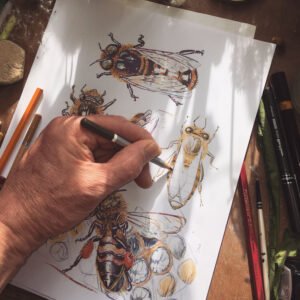World Bee Day
Today, 20th May 2020, is world Bee Day, so it feels like a good day to talk about bees and other pollinators.
Flowers and Fruit
Most of us like flowers in some way or other and most of us like fruit in some form or other too. Most of the fruits and nuts we eat come from flowers. Many fruits were probably developed by plants to attract us or animals like us; frugivores. Most frugivores are used by the plants to spread and fertilize seeds with our poo. It’s funny to think that plants cannot see or hear us as we understand it but they know we are there. What must their world be like? Nuts on the other hand are mostly developed to resist us! But some do well by producing copious amounts that are stored by squirrels, jays and others.
Plants were not targeting us when they developed flowers. Targeting is wrong for a start. Plants that produced large amounts of pollen simply did better than those producing less. Others added to the bounty by producing nectar and guidance like coloured petals and scents. All accidental successes (genetic errors that worked) that led to the flowers we know today as recently as the time of the dinosaurs. Did you know flowers are younger than proto-mammals but older than monkeys?
Flowers Depend on Insects
Flowers are made mostly for insects and many, probably most, flowering plants now depend on insects to take their pollen from one flower to the other and continue their existence. Similarly, many insects are dependent not just on flowers but on particular plants to complete their life cycle. They are inextricably entangled in beautiful ecological webs.
Humans Break Things!
That’s where we come in. We as a species have become very good at breaking things. We break insect life cycles by removing plants we call weeds, or killing pollinators when we were aiming for ‘pests’. The best, but not the only, pollinators are bees and they depend on a rich supply of pollen and nectar through spring summer and autumn. Monoculture over large areas of farmland as well as mechanised hay gathering creates a boom and bust ecology where flowers are prolific one day and gone the next. There are over 270 British bee species all with different needs.
Our breaking skills come in again when we tidy up, removing nesting places such as old trees, sheds and holes in eaves of houses, mowing verges and field edges and replacing wood with metal and plastic, thatch with tiles and flower beds and meadows with lawns and paving which we treat to supress weeds and unwanted insects. But the flowers and insects that are wanted disappear as well.

You Can Help
Here’s where you come in. You can help create continuous pollen and nectar flows in your garden, or on your windowsill. You can lobby your council and local land owners (churchyards, farmers, gardeners, businesses) to be more bee friendly. This quickly leads to more bees, butterflies, berries, birds and flowers. Weeding is much better than spraying and poisoning and untidying, at least in part, is much better than tidying. Many bees benefit from log and timber piles and holes drilled into wood will help them to. South facing walls and dry slopes can be very useful if exposed to the sun. Ponds are very good for increasing the diversity of plants and supplying clean water for honey bees.
“The longest list of bees from a single site anywhere in Britain (133 species) comes from a Surrey garden.”
Steven Falk, Field Guide to the Bees for Great Britain and Ireland, Bloomsbury 2015
Without bees we will have less flowers and fruit which leads to even fewer bees and fewer flowers and so on. We not only need fruit we need beauty and nature around us and this can only exist if we stop breaking things and let nature grow.
Discover more about honey bees and their pollen on our honeybees poster print.


